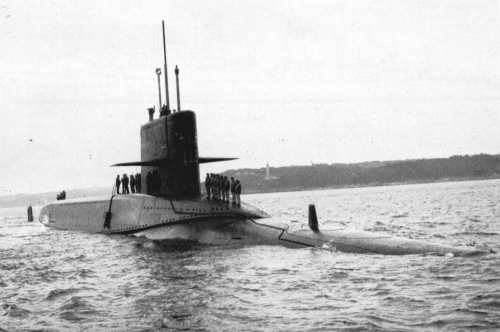

Le Redoutable 1980
| Name | No | Yard No | Builder | Laid down | Launched | Comp | Fate |
| Le Redoutable | S611 | Q75 | Arsenal de Cherbourg | 30.3.1964 | 29.3.1967 | 1.12.1971 | stricken 12.1991 |
| Le Terrible | S612 | Q76 | Arsenal de Cherbourg | 24.6.1967 | 12.12.1969 | 1.1.1973 | stricken 7.1996 |
| Le Foudroyant | S610 | Q77 | Arsenal de Cherbourg | 12.12.1969 | 4.12.1971 | 6.6.1974 | stricken 4.1998 |
| L'Indomptable | S613 | Q78 | Arsenal de Cherbourg | 4.12.1971 | 17.9.1974 | 23.12.1976 | stricken 5.2005 |
| Le Tonnant | S614 | Q79 | Arsenal de Cherbourg | 19.10.1974 | 17.9.1977 | 3.5.1980 | stricken 9.1999 |
|
Displacement standard, t |
|
|
Displacement normal, t |
8000 / 9000 |
|
Length, m |
128.0 |
|
Breadth, m |
10.6 |
|
Draught, m |
10.0 |
|
No of shafts |
1 |
|
Machinery |
1 nuclear reactor, 2 sets geared steam turbines |
|
Power, h. p. |
16000 |
|
Max speed, kts |
20 / 25 |
|
Fuel, t |
nuclear |
| Endurance, nm(kts) | practically unlimited |
|
Armament |
S611, 612: 16 M-1 SLBM (16 M-1), 4 - 550 TT (bow, 18) S610: 16 M-2 SLBM (16 M-2), 4 - 550 TT (bow, 18) S613, 614: 16 M-20 SLBM (16 M-20), 4 - 550 TT (bow, 18) |
| Electronic equipment | DRUA-33 radar, DUUV-23, DUUX-2 sonars, ARUR-12 ECM suite, SEAO/OPSMER CCS |
| Complement | 135 |
| Diving depth operational, m | 200 |
Project history: Owing to the political circumstances in which the Force de Dissuasion was conceived, no US assistance in the design and construction of the SNLEs was forthcoming. The first reactor constructed, the PAT 1, was produced in collaboration with the CEA (the French Atomic Energy Authority) and tested extensively ashore at Cadaraché. Simultaneously development of the missiles took place, the first MSBS being launched from the experimental submarine Gymnote at the Landes Trials Centre at the end of 1968.
Construction of the submarines posed a number of technical problems such as the development of the high-tensile steel to cope with the increase in diving depth (up to 300m), the adaptation of the hull to nuclear propulsion, and the development of suitable steering mechanisms. The cylindrical hull was constructed using prefabricated all-welded sections each of 200t.
In addition tothe main propulsion machinery there was an emergency diesel capable of bringing the submarine home in the event of a failure in the nuclear plant; it had a range of about 5000nm. The diving planes were on the fin, as in US boats. Four torpedo tubes were fitted forward, a total of eighteen torpedoes being carried. The submarine's position can be accurately determined by reference to three inertial navigation centres (CIN) ashore, and there was a periscope for celestial navigation.
The first MSBS was the M-1, an 18t two-stage missile of similar length and diameter to the US Poseidon, but carrying only a single 500-kiloton warhead and with a range of only 2500km. The M-1 missile was installed in the first two boats, but was then superseded by the 3000km M-2, which went into service aboard the third boat. Le Foudroyant. From 1976 onwards, both the M-1 and the M-2 were replaced by the M-20, which had a one-megaton thermonuclear warhead and an upgraded re-entry vehicle system.
L'lndomptable and Le Tonnante had a metallic reactor core in place of the oxide cores of earlier boats.
Modernizations: 1977-1978, Le Redoutable, Le Terrible: - 16 M-1 SLBM; + 16 M-20 SLBM (16 M-20)
1979, Le Foudroyant: - 16 M-2 SLBM; + 16 M-20 SLBM (16 M-20)
1987, Le Tonnant; 1989, L'Indomptable; 1990, Le Terrible; 1992, Le Foudroyant: - 16 M-20 SLBM, DUUV-23, DUUX-2 sonars; + 16 M-4 SLBM (16 M-4), ability to fire SM39 Exocet SSM (4 SM39), DMUX-21 sonar suite (DUUV-23, DUUX-5, DSUV-61B towed array sonars)
Naval service: No significant events.

Le Redoutable 1975

L'Indomptable 2002
© Ivan Gogin, 2016